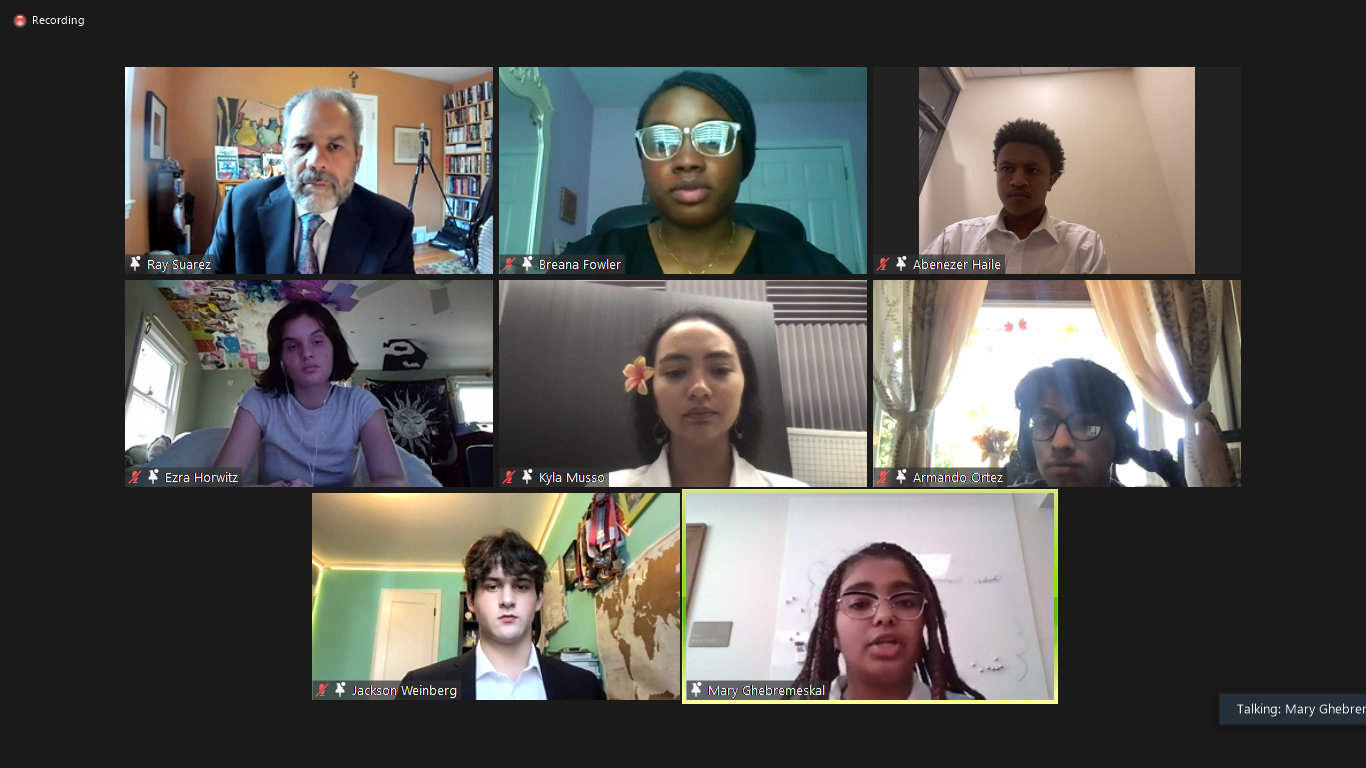- Council of the Great City Schools
- Student School Board Members Aim to be Heard at Town Hall
Urban Educator - November/December 2021
Page Navigation
- Urban School Districts Host Vaccination Clinics for Ages 5-11
- Changes at the Helm: NYC, L.A., and El Paso School Districts
- Historian, Philanthropist and 2021 National Teacher of Year Address Council
- Student School Board Members Aim to be Heard at Town Hall
- Miami School Board Member Named Top Educator
- Voters Decide on Education Ballot Issues
- Legislative Column
- Former Dayton Schools Superintendent; Fort Wort and Denver Board Members Remembered
- Baltimore Launches Student Learning Plans
Student School Board Members Aim to be Heard at Town Hall
-
Student representatives to urban school boards offered insights into that experience as participants in the virtual Town Hall at the Council of the Great City Schools’ 65th Fall Conference.
The Town Hall was sponsored by the Chan Zuckerberg Initiative and moderated by award-winning veteran journalist Ray Suarez.
Jackson Weinberg, representative to Oregon’s Portland Public Schools Board of Education, said the student perspective differs from other board members in that students have a greater sense of urgency. While other board members have four-year terms, “we only have one year” to obtain results, Weinberg said.
“That’s a really interesting point,” Suarez responded. “A policymaker may see a long-standing problem that needs a long-standing solution that may take a long time to implement but you want action now.”
Abenezer Haile, student member of the Metropolitan Nashville Board of Public Education, said he has been able to offer first-hand experience, for instance, on why test scores vary from school to school. “I’ve seen it myself—a lack of rigorous, challenging courses being offered to kids in Black or less wealthy neighborhoods,” he said, information he shared with the board.

Mary Ghebremeskal, student representative to the Minneapolis School Board, said fellow board members had sought out her opinion about the impact of policies on students. She described herself as being a voice for students. When an issue arises, board members “turn to me and ask, is this actually working? What should we do? How can we change things,” she said.
Kyla Musso, board of education student representative for the state of Hawaii, said the voting members “did want to hear my input about the kind of characteristics students want to see in our next [state] superintendent.” She said she felt “fortunate” to offer her opinions.
Armando Ortez, student representative for Philadelphia’s Board of Education, who said he was still getting used to public speaking, recalled how he spoke up on the issue of gun violence and how commuting to school may be unsafe for students. Another issue, he said, was a lack of mental health resources for students and teachers who have had traumatic experiences.
Breana Fowler, student adviser to North Carolina’s Charlotte-Mecklenburg board, said it is important for school districts to “put an emphasis on student voice in the classroom,” especially in history classes, and that school administrators should enable students to have the space to speak out and inquire about issues impacting them.
Pandemic-related Issues Dominate Discussion
Ezra Horwitz, student commissioner for Baltimore City Public Schools, said the pandemic had led to more awareness of the need for mental health and she noted that some schools in the district have more counselors than others and that needs to change.
Weinberg commented that the “new routines we’ve had to create after 18 months of not being in school has been super stressful” and raised issues of equity and access and whether some demographics had less access to mental health and other services during covid lockdowns.
Fowler believes incorporating peer mediation programs and restorative justice practices will help reduce suspension rates.
Haile said the lack of day-to-day structure in students’ lives while they were learning remotely took a toll. “It’s been very hard on students and hard on parents too,” Haile said. With school in session, he said, “students have started to enjoy school again… being with people you’re familiar with, who you love.”
Ghebremeskal agreed, saying the reopening of school has been “kind of a bumpy road.” She mentioned bus driver shortages that impacted commutes. But students “just want to be in school very much and are trying to get back into things they did before, trying to rebuild clubs, rebuild student groups,” she said.
Media Contact:
Contact Name
Contact@email.com
(000) 000-0000
Contact Name
Contact@email.com
(000) 000-0000
Contact Name
Contact@email.com
(000) 000-0000
Media Contact:
Contact Name
Contact@email.com
(000) 000-0000
Contact Name
Contact@email.com
(000) 000-0000
Contact Name
Contact@email.com
(000) 000-0000


